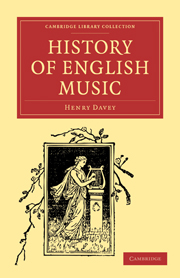Book contents
- Frontmatter
- PREFACE
- Contents
- CHAPTER I BEFORE THE INVENTION OF COMPOSITION
- CHAPTER II THE INVENTION OF POLYPHONY (1400–53)
- CHAPTER III THE PERIOD OF THE INVENTION OF INSTRUMENTAL COMPOSITION (1453–1536)
- CHAPTER IV THE REFORMATION: FROM THE DISSOLUTION OF THE MONASTERIES TO THE DEFEAT OF THE ARMADA (1536–88)
- CHAPTER V THE MADRIGALIAN PERIOD (1588–1630)
- CHAPTER VI THE AGE OF THE DECLAMATORY SONGS, OF THE FANCIES FOR VIOLS, AND OF THE SUPPRESSION OF ECCLESIASTICAL MUSIC (1630–1660)
- CHAPTER VII THE PERIOD OF FOREIGN INFLUENCE, AND OF DRAMATIC MUSIC (1660–1700)
- CHAPTER VIII THE PERIOD OF PATRIOTIC SONGS (1701–1800)
- CHAPTER IX THE NINETEENTH CENTURY
- APPENDIX
- INDEX
CHAPTER VIII - THE PERIOD OF PATRIOTIC SONGS (1701–1800)
Published online by Cambridge University Press: 29 August 2010
- Frontmatter
- PREFACE
- Contents
- CHAPTER I BEFORE THE INVENTION OF COMPOSITION
- CHAPTER II THE INVENTION OF POLYPHONY (1400–53)
- CHAPTER III THE PERIOD OF THE INVENTION OF INSTRUMENTAL COMPOSITION (1453–1536)
- CHAPTER IV THE REFORMATION: FROM THE DISSOLUTION OF THE MONASTERIES TO THE DEFEAT OF THE ARMADA (1536–88)
- CHAPTER V THE MADRIGALIAN PERIOD (1588–1630)
- CHAPTER VI THE AGE OF THE DECLAMATORY SONGS, OF THE FANCIES FOR VIOLS, AND OF THE SUPPRESSION OF ECCLESIASTICAL MUSIC (1630–1660)
- CHAPTER VII THE PERIOD OF FOREIGN INFLUENCE, AND OF DRAMATIC MUSIC (1660–1700)
- CHAPTER VIII THE PERIOD OF PATRIOTIC SONGS (1701–1800)
- CHAPTER IX THE NINETEENTH CENTURY
- APPENDIX
- INDEX
Summary
WE have now reached the prosaic period, when England, for 300 years distinguished by its musical skill, sank so far from its old repute as to acquire the name of an unmusical country, a disrepute which it still retains so far that many read with astonishment and even incredulity of its glorious achievements in the past.
What could have been the reason or reasons for so extraordinary a change? The principal reason undoubtedly was and is the centralisation of England in London, which gives no chance to performers or composers elsewhere. London itself has too huge, heterogeneous, and changing a population to be an artistic centre at all commensurable with its importance in the kingdom, while at the same time it prevents any other town from becoming one, as all first-rate talent of every description gravitates there; London musicians themselves have to contend with the very greatest performers of the whole world. No other town in the British Islands offers any career to a musician except as an organist or teacher. We have no small governments or local princes requiring local orchestras, if we except the Viceroy of Ireland; and our cathedrals, which might partially replace this want, are generally in small towns which have been very far outstripped by others, and now have little importance even in their own province. Consequently our best musicians avoid them, and come to London.
This centralising had already begun under James I, when complaints were made that the northern castles were neglected and falling into ruin; it was enormously accelerated by the Civil War, when the castles of the Royalist nobility were all dismantled.
- Type
- Chapter
- Information
- History of English Music , pp. 366 - 431Publisher: Cambridge University PressPrint publication year: 2009First published in: 1895



